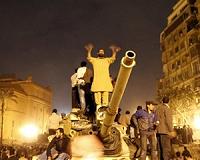 |
Cairo (UPI) Feb 3, 2011 Egypt's military has deployed troops to protect an oil pipeline linking the Red Sea and the Mediterranean amid growing concerns the political upheaval sweeping the country could threaten the vital oil artery and other key economic installations. The Sumed pipeline, which became operational in 1977, runs through the heavily populated Nile Valley and terminates near the coastal city of Alexandria, which has been a center of violent protests against the regime of President Hosni Mubarak. Even if the pipeline was hit or forced to shut down, the global impact wouldn't be great since the oil it carries could be shipped by other means. Actual oil production in the Persian Gulf wouldn't be curtailed. The worst-case scenario would mean delivery delays as tankers would have to sail the longer route from the Middle East around the Cape of Good Hope at the southern tip of Africa. "Egypt has a fairly limited role in the global energy sector," global security consultancy Stratfor says. "Although there are several pieces of energy infrastructure in Egypt that are important to the international energy market, the protests have yet to -- and are unlikely to -- have any major effects on global energy." A potential target for the anti-government forces is the Suez Canal, a 120-mile-long waterway linking the Red Sea and the Mediterranean through which 8 percent of the world's seaborne trade passes. The only known threat in recent years was in 2009, when dozens of suspected saboteurs, including operatives of Lebanon's Iranian-backed Hezbollah group, were convicted of plotting to attack ships in the canal. Had those attacks been carried out successfully, the waterway could have been blocked and out of action for weeks. But despite the current unrest, it remains open and Suez Canal Authority officials say there is no direct threat to the waterway, inaugurated Nov. 16, 1869. So far, shippers haven't diverted any vessels but these days most seaborne oil supplies bypass Suez. The general belief is that anti-government forces are unlikely to cut off the $5 billion the canal produces for the state every year. That may be wishful thinking as the unrest has taken a more violent turn. But Abdallah Al-Badri, secretary-general of the Organization of Petroleum Exporting Countries, said, "I don't think the Egyptians will ever dare touch it." The Sumed pipeline was built to allow oil shipments bound for Europe and the United States to avoid the canal, which was closed for long periods because of Arab-Israeli wars in 1956, 1967 and 1973. Indeed, the latter conflicts accelerated the development of supertankers, or Very Large Crude Carriers, which could make the voyage around the Cape of Good Hope economically viable. These days, tankers from the Persian Gulf unload at the pipeline's southern terminal at Ain Sukhna on the Gulf of Suez and the crude is then pumped to the Mediterranean coast at Sidi Kerir on the western side of the Nile Delta for loading onto other tankers. The Financial Times reports that the number of guard posts along the 22-mile pipeline has been doubled to 30 after military units were deployed Jan. 28. The pipeline has a maximum capacity of 2.5 million barrels a day but has been operating at less than half that level at around 1.1 million bpd. Egypt itself is a minor oil producer but it is a major player in the natural gas market. In 2009, it produced 62.7 billion cubic meters, the second highest total in Africa. Of that, 13 billion cubic meters were exported as liquefied natural gas. And here the Suez Canal assumes considerable importance since it is used by LNG tankers from the gulf en route to energy-hungry Europe. Some 240 made the south-north transit in 2009. Egypt has two LNG export terminals at Idku and Damietta on the Mediterranean coast. The gas they process comes largely from offshore fields, which limits the danger of attack. The Arab Gas Pipeline, which supplies gas to Israel, Jordan and Syria, is more vulnerable. It runs from Port Said at the northern end of the canal, across the Sinai Peninsula to the Gulf of Aqaba, an arm of the Red Sea. The 750-mile pipeline has a capacity of 10.3 million cubic meters per year.
Share This Article With Planet Earth
Related Links Democracy in the 21st century at TerraDaily.com
 Outside View: Egyptian unrest
Outside View: Egyptian unrestWashington (UPI) Feb 2, 2011 Is what is happening in Egypt today, and Tunisia earlier, the harbinger of viral unrest with consequences akin to the French Revolution of 1789 or the Russian Revolution of 1917 but in real time? Or, is this unrest a localized protest over the continuing absence of jobs, food and political inclusion that so far lacks an ideological motivation and is unlikely to spread throughout the reg ... read more |
|
| The content herein, unless otherwise known to be public domain, are Copyright 1995-2010 - SpaceDaily. AFP and UPI Wire Stories are copyright Agence France-Presse and United Press International. ESA Portal Reports are copyright European Space Agency. All NASA sourced material is public domain. Additional copyrights may apply in whole or part to other bona fide parties. Advertising does not imply endorsement,agreement or approval of any opinions, statements or information provided by SpaceDaily on any Web page published or hosted by SpaceDaily. Privacy Statement |